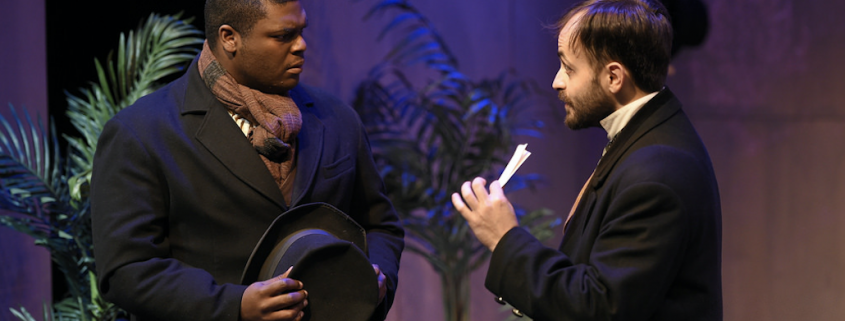School of Dramatic Arts to stage Shakespeare comedy

Promising professions of love, daring outlaw and moral ambiguities topped off with an unforgettable ending realized by director Drew Barr, School of Dramatic Arts students will perform William Shakespeare’s comedy “The Two Gentlemen of Verona” Thursday at Bing Theatre.
“The Two Gentlemen of Verona” opens with a problem: young Proteus must venture to Milan with his best friend Valentine and leave the professed love of his life, Julia, at home to become a man in his own right. While in Milan, however, both men fall for the damsel Silvia, and Proteus plots to have Valentine banished so he can have Silvia all to himself. What Proteus does not know is that Julia followed him to Milan dressed as his manservant, calling herself Sebastian. The plot only continues to thicken as Valentine returns with his band of outlaws to seek retribution.
In preparation for the play, members of the Master in Fine Arts Acting Program worked 48 hours every week throughout the month of February. The student actors aim to move audiences through their interpretation of the “elevated” world Shakespeare brings to the stage, said MFA acting student Atiya Walcott, who plays Julia.
Walcott explained the importance of creating a believable environment for Shakespeare’s fanciful tale.
“In Shakespeare’s world, his plays are about forgiving the unforgivable,” Walcott said. “Shakespeare’s play takes place in a heightened state … It’s not a world in which we can readily be placed.”
The viewer, although removed from the throes of Elizabethan England, is submerged in the play’s themes of human nature and reconciliation, Walcott said.
“You want to see people forgive the unforgivable on stage because people don’t do that,” Walcott said. “It’s way harder to forgive your best friend … than to hate your best friend for the rest of your life.”
While Walcott does not promise the cast of “The Two Gentlemen of Verona” will succeed in moving the audience in this way, she trusts in the effort of the Dramatic Arts program actors and the language of Shakespeare itself.
“When [a play] is done well, it makes you feel something that you don’t feel normally,” Walcott said. “You will be moved in a very real way, if it is done well, which is very hard to do.”
About 30 individuals work on the set, which itself is unconventional in structure and flexibility. There are 15 characters, but only nine people act in the show. Barr’s version of this tale has permission to bend the rules because of the topsy-turvy world Shakespeare wrote into existence, according to Walcott.
“There’s a duke that’s played by a woman. There’s a damsel in distress that’s played by a man,” Walcott said.
Gender-bending in the play not only allows the cast to fill a variety of diverse roles, but it also emphasizes the comic effect of Julia’s transformation and echoes the Shakespearean practice of substituting males in female positions when women were not allowed to step onstage.
Walcott said the majority of the cast is comprises people of color, another important factor in their take on Shakespeare.
“Seven out of nine of us are black,” Walcott said. “I’m very moved that we have this largely black ensemble during Black History Month, [especially] doing William Shakespeare, which is a very European-centric based play.”
The play also benefits from Drew Barr’s direction. Barr is a guest director at USC who led SDA’s production of “The Matchmaker” in February 2018. He has also helped direct Broadway productions of “War Horse,” “All My Sons” and “Twelfth Night.”
Barr’s production of Shakespeare’s “The Two Gentlemen of Verona” will run from Feb. 21 to 24.

